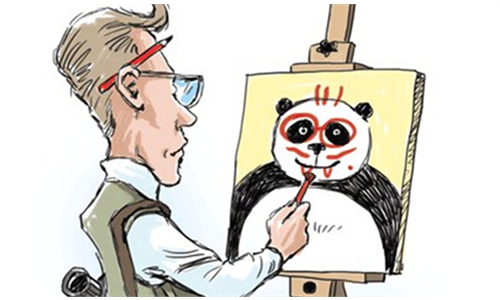IN-DEPTH / IN-DEPTH
GT investigates: How some Western news agencies deceive Chinese people, distort truth while claiming not to have freedom

Photo:VCG
Editor's Note:
On April 8, 2024, the Foreign Correspondents Club of China (FCCC), which has long attacked China and accused the country of "suppressing" the freedom of foreign journalists in China, released its 2023 annual "media freedoms report," once again accusing China of "restricting" the freedom of foreign journalists."
However, the qualifications and background of the FCCC itself are in question. On the one hand, Chinese authorities have never recognized the legitimacy of this organization or its role as a representative body for foreign journalists in China; on the other hand, the organization not only holds strong ideological biases against China, but also is deeply involved in providing cover for and whitewashing actions that harm China's national security, especially by anti-China forces in the US and the West.
Some foreign journalists who do not want to be associated with this organization have revealed that it is controlled by media organizations and individuals who uphold the Western discourse hegemony. Their focus is not on objectively reporting on China, but rather on smearing and demonizing the country.
Through investigation, the Global Times has found three solid examples that expose the real intention of the FCCC, which has nothing to do with "freedom."
I felt being used as 'pawn'
Mr Xu is a coach of an amateur women's soccer club in Beijing. In June 2023, he received a message on the Chinese lifestyle-sharing platform Xiaohongshu. The person who sent the message claimed to be from German TV station ZDF. Xu was told that ZDF wanted to interview the club in anticipation of the upcoming 2023 Women's World Cup and introduce the situation of women's soccer in China.
According to Xu, at the time, journalists from ZDF only mentioned that they were there to interview and report on his club and women's soccer in China. They said that they were also planning to do similar interviews in other countries to introduce the development of grassroots women's soccer around the world.
During the interview, ZDF reporters kept giving Xu the impression that they only wanted to report on grassroots women's soccer in China. Therefore, Xu, who was very willing to introduce China's grassroots women's soccer to the world, warmly welcomed the team of reporters to film interviews with the club's players, and he felt honored to represent China in the report.
However, when the program was officially broadcast on the official ZDF website, Xu was astonished to find that he had been deceived by the German media outlet, and felt as though he had been "used as a pawn."
The program broadcast by this German media outlet only used the interview with Xu's club and players as part of a larger project. The aired program contained a lot of politicized content, and used out-of-context quotes to smear China's women's rights issues, and by extension, attack China's epidemic prevention policies.
When viewed in its entirety, the report on Xu's women's soccer club does not seem to genuinely introduce China's women's soccer scene, but rather creates a "hell-like contrast" to suggest that the status of Chinese women is actually very low, Xu said.
Xu complained to the Global Times that he felt the complete program broadcast by the German media outlet looked "strange" and he couldn't understand whether they intended to report objectively or were set to deliberately vilify, because he felt that the portrayal of women's situation in Chinese society by this German media outlet was far from factual, and resembled the plight of women in far less developed countries.
Another reason why Xu feels he was deliberately misled is, before the program was aired, and upon request, Xu was shown a sample of the scheduled broadcast. However, after the complete program was aired, he found that the sample shown to him by the German media outlet was not the full version actually broadcast by the TV station. They also never informed Xu how the full version of the program would be edited and what other content would also be included.
Additionally, when the TV station first showed Xu the edited sample, he noticed that the Chinese map used by the TV station did not include the island of Taiwan and the South China Sea region, and there were also omissions in the Xizang Autonomous Region and Xinjiang Autonomous Region. Even after he raised this issue with the TV station, the final version still did not include the right map.
After the program was aired, Xu expressed his strong dissatisfaction at the actions of the German TV station, and protested against the map issue and the use of the club as a "pawn" in the program, demanding that the program be taken off the air. The person who initially contacted him from the TV station in China, however, passed the buck, arguing that this was a decision made by the German headquarters and that the China team could not decide on the matter.
Xu said that although this episode did not have a significant negative impact on him, the club, or the players who were interviewed, the irresponsible actions of this German media outlet have caused trouble for the club - especially for some of the players who appeared in the program, some of whom are university students, due to the misrepresentation of their opinions.
Xu's experience vividly illustrates an important reason why some Western media outlets are increasingly being rejected by the Chinese public: These media outlets do not respect their interview subjects, but instead deceive and exploit them to serve a predetermined narrative meant to demonize China.
No apology
Mr Luo is an economist from China. In July 2023, he was suddenly asked by a friend whether he had been interviewed by Bloomberg. This puzzled him because he had never been interviewed by the US-based media outlet. After a brief search, Luo found a Bloomberg article that had used a piece he had previously published on his WeChat account about the Chinese economy, in which Luo provided an analysis of the future of the Chinese economy. However, because they did not clarify that it was partly taken from the article, it gave the impression that Luo had been personally interviewed for the Bloomberg article.
But when Luo carefully examined the citation of his article by Bloomberg, he was surprised to find that Bloomberg had not accurately presented his views, but instead cherry-picked a few sentences that could easily be misinterpreted.
Luo believed that this would lead to his views being misunderstood and inadvertently mislead others, so he requested that Bloomberg correct the glaring errors. However, Bloomberg only added a note in the article stating that the views related to Luo were taken from his public WeChat account article and included a link, but did not address the accusation of using cherry-picked quotes made by Luo.
Frustrated, Luo engaged the services of a lawyer who sent a formal letter to Bloomberg's office in China and even went there in person to defend his rights, but he was turned away. In fact, a Bloomberg staffer, in a strongly-worded reply to the letter, stated that Bloomberg did not agree with Luo's accusation of selective quoting and therefore would not retract the article or issue an apology.
Bloomberg dismissed Luo's remonstrations despite giving the impression of respecting his views by quoting him, proving that Luo's opinions don't matter unless otherwise validated by the large media outlet.
Luo's situation is far from the only instance in which Bloomberg has stood accused of false reporting. On March 6, 2024, the Hong Kong Special Administrative Region (HKSAR) government released a statement that strongly disapproved of and condemned Bloomberg's news headlines "HK says Telegram should be prohibited in Article 23 proposal," "HK says Signal should be prohibited in Article 23 proposal", and "HK Security Law Public Consultation Lists Facebook, YouTube Ban."
Those reports falsely reported that the HKSAR government would legislate to ban the operation of the mentioned platforms in Hong Kong, thereby generating misunderstanding and panic regarding the legislative proposals on Article 23 of the Basic Law, read the statement.
Freedom or discourse hegemony?
In October 2023, a Chinese woman surnamed Chen who had been living in Sweden for 20 years, was suddenly arrested by the Swedish security service in October and expelled by the government in Stockholm, after being accused of posing a national security threat, according to media reports.
The Global Times learned that Chen wrote several objective articles about China, especially regarding the situations in Xinjiang and Xizang, and organized some lectures to present the true situation in Xinjiang.
However, Chen's situation has become increasingly common in the recent past. From Canada to the US to Australia and other Western countries, media outlets constantly platform anti-China secessionists and widely publish distorted reports about China. Some Western media outlets even collaborate with their countries' intelligence agencies and other institutions in the private sector to weaken China's national security, analysts have pointed out.
What the FCCC really wants is not the freedom to report the news objectively, but the freedom to maintain this "distorted" discourse hegemony, experts warned.
Meanwhile, it is worth noting that trust in the media among Americans reached a historic low. According to a Gallup poll conducted in October 2023, only 32 percent of respondents expressed a high level of trust in the mass media. Another 29 percent indicated having "not very much" trust, while a record-high 39 percent stated they had "none at all."
Moreover, this situation is not unique to the US. A poll in November 2023 also showed that public trust in the mainstream news media in the UK ranked last among the 28 countries surveyed, with only 31 percent of UK respondents trusting the country's news media establishment.
Perhaps the FCCC should first consider the reasons behind this trend. They should think about why the citizens of their own countries are increasingly losing trust in them, experts warned.

